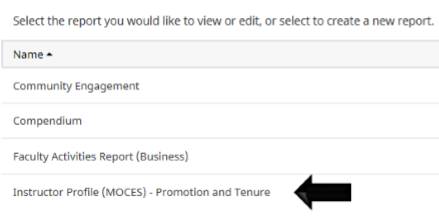How to Generate an Instructor Profile Report in Faculty Success
All faculty with a Faculty Success account can generate an "Instructor Profile (MOCES) - Promotion and Tenure" report to see their combined core item median and comparison statistics. Chairs and deans can generate Instructor Profile reports for faculty in their college/department.
Results for the most recent semester are typically available in Faculty Success two weeks after final grades are due.
Follow the steps below to generate a "Instructor Profile (MOCES) - Promotion and Tenure" report in Faculty Success. Scroll to the bottom of this page for guidance on how to interpret the report.
Step 1: Log in to Faculty Success
|
|
Log in to the Faculty Success system using the firtsname.lastname portion of your email address and your CheckMarq password.
|
Step 2: Click “Reports” in the top menu.
|
 |
Step 3: Run the Instructor Profile Report
|
|
Scroll down and select the report titled “Instructor Profile (MOCES) – Promotion and Tenure” from the alphabetical list of reports.

Choose the desired start and end dates for the report, then click “Run Report” in the top, right corner.
Click the “Run Report” button in the top, right corner
Your report will generate as a Microsoft Word document. Only classes that have associated course evaluation results will appear in the report. MOCES results for future terms are uploaded to the Scheduled Teaching section of Faculty Success following the end of each term. An upload schedule of these and other system information uploads is posted on the Faculty Success website and updated prior to the start of each academic year.
|
Interpreting the Instructor Profile Statistics
Statistic
|
Description
|
|
Total Enroll
|
Total number of students enrolled in the class at the time of the evaluation.
|
|
Total Resp
|
Total number of students who submitted an evaluation.
|
|
Resp Rate
|
Response rate; the percentage of students enrolled who submitted an evaluation.
|
|
Core Item Median
|
The core item median is the median of the pooled responses to the four core items. These are: How was this class as a whole? How was the content of this class? How was the instructor's contribution to this class? How effective was the instructor in this class? All core items and the combined median have a 1 – 6 response scale: Excellent (6); Very Good (5); Good (4); Fair (3); Poor (2); and Very Poor (1).
|
|
Department and College Comparison Statistics
|
The department and college comparisons are based on classes evaluated within the last two academic years in the same department/college and course level. Course levels are: lower division undergraduate; upper division undergraduate; graduate. For purposes of calculating these statistics, courses are assigned to the department and college to which they belong administratively (displayed at the upper left of the report).
Comparison data do not include classes with five or fewer responders where the response rate was less than 100%. In addition, comparison data are suppressed when the comparison group is comprised of fewer than ten classes. Online/ hybrid classes may be more likely to have the comparison results suppressed due to this change as many departments do not have enough online/hybrid classes to compare. Summer comparison data are not applicable due to the small number of classes evaluated
- 20th-50th-80th Percentile: Shows the distribution of core item medians among classes in the comparison group. 20th percentile is the score below which 20% of the classes in the comparison group are found. The 50th percentile represents the median. The 80th percentile is the score below which 80% of the classes in the comparison group are found.
- Total Classes: Number of class sections in the comparison group.
|
Please email facultysuccess@marquette.edu with any questions.


